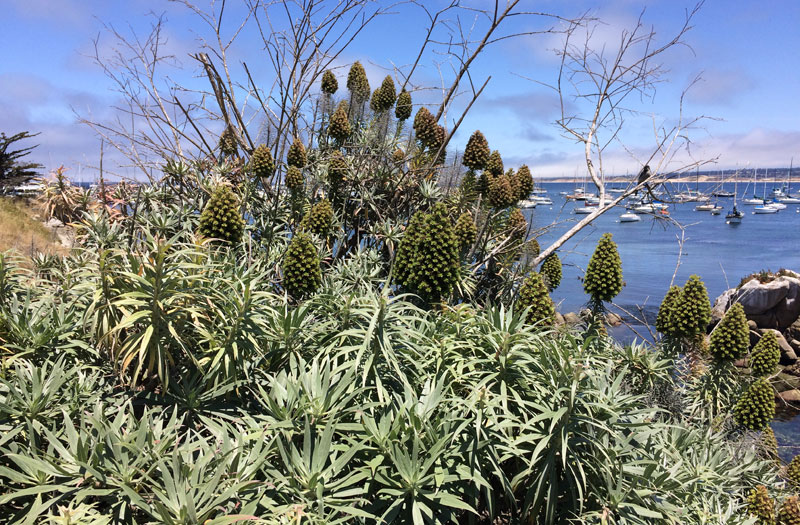[Click on BLUE links for further information]
Think in the Morning posts a poem and a selection of Napkin Art every day on our Facebook Page (search for @ThinkintheMorning). This is the 7th group that we have consolidated on this blog.
Seven Strophes
Joseph Brodsky
I was but what you’d brush
with your palm, what your leaning
brow would hunch to in evening’s
raven-black hush.
I was but what your gaze
in that dark could distinguish:
a dim shape to begin with,
later – features, a face.
It was you, on my right,
on my left, with your heated
sighs, who molded my helix
whispering at my side.
It was you by that black
window’s trembling tulle pattern
who laid in my raw cavern
a voice calling you back.
I was practically blind.
You, appearing, then hiding,
gave me my sight and heightened
it. Thus some leave behind
a trace. Thus they make worlds.
Thus, having done so, at random
wastefully they abandon
their work to its whirls.
Thus, prey to speeds
of light, heat, cold, or darkness,
a sphere in space without markers
spins and spins.
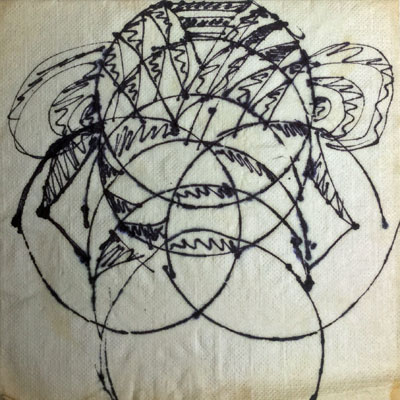
Sea Gull Cellar Bar Napkin Art, artist unknown
Poetry is a Destructive Force
Wallace Stevens
That’s what misery is,
Nothing to have at heart.
It is to have or nothing.
It is a thing to have,
A lion, an ox in his breast,
To feel it breathing there.
Corazon, stout dog,
Young ox, bow-legged bear,
He tastes its blood, not spit.
He is like a man
In the body of a violent beast
Its muscles are his own…
The lion sleeps in the sun.
Its nose is on its paws.
It can kill a man.
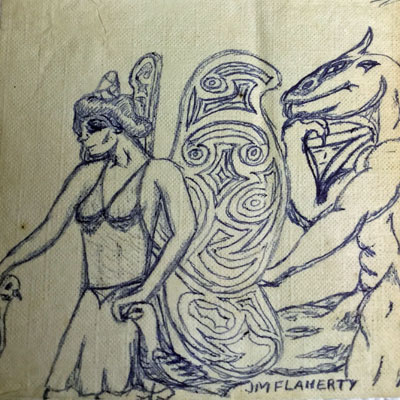
Sea Gull Cellar Bar Napkin Art, JM Flaherty artist
Sheep
Jane Hirshfield
It is the work of feeling
to undo expectation.
A black-faced sheep
looks back at you as you pass
and your heart is startled
as if by the shadow
of someone once loved.
Neither comforted by this
nor made lonely.
Only remembering
that a self in exile is still a self,
as a bell unstruck for years
is still a bell.
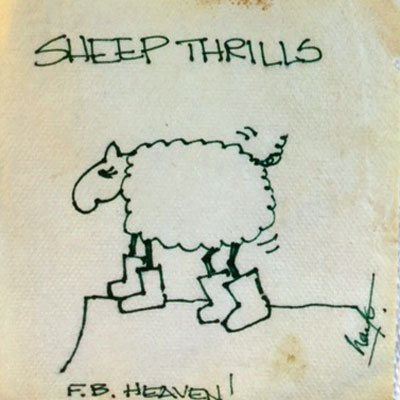
Sea Gull Cellar Bar Napkin Art, Jack Haye artist
Carson McCullers
Charles Bukowski
she died of alcoholism
wrapped in a blanket
on a deck chair
on an ocean
steamer.
all her books of
terrified loneliness
all her books about
the cruelty
of loveless love
were all that was left
of her
as the strolling vacationer
discovered her body
notified the captain
and she was quickly dispatched
to somewhere else
on the ship
as everything
continued just
as
she had written it
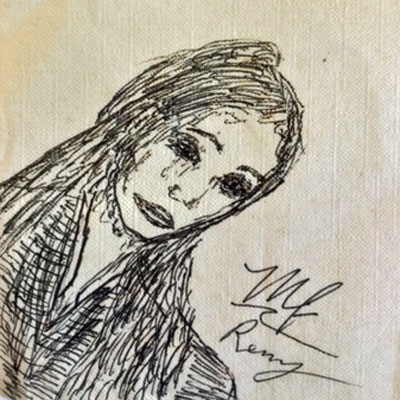
Sea Gull Celler Bar Napkin Art, MF artist
History
Jennifer Michael Hecht
Even Eve, the only soul in all of time
to never have to wait for love,
must have leaned some sleepless nights
alone against the garden wall
and wailed, cold, stupified, and wild
and wished to trade-in all of Eden
to have but been a child.
In fact, I gather that is why she leapt and fell from grace,
that she might have a story of herself to tell
in some other place.
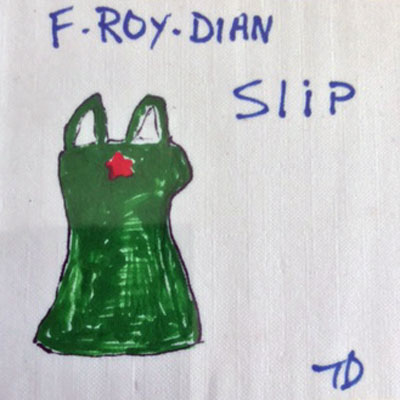
Sea Gull Cellar Bar Napkin Art, artist unknown
Gray
Alice Walker
I have a friend
who is turning gray,
not just her hair,
and I do not know
why this is so.
Is it a lack of vitamin E
pantothenic acid, or B-12?
Or is it from being frantic
and alone?
‘How long does it take you to love someone?’
I ask her.
‘A hot second,’ she replies.
‘And how long do you love them?’
‘Oh, anywhere up to several months.’
‘And how long does it take you
to get over loving them?’
‘Three weeks,’ she said, ‘tops.’
Did I mention I am also
turning gray?
It is because I adore this woman
who thinks of love
in this way.

Sea Gull Cellar Bar Napkin Art, artist unknown
Ars Poetica
Archibald MacLeish
A poem should be palpable and mute As a globed fruit,
Dumb
As old medallions to the thumb,
Silent as the sleeve-worn stone
Of casement ledges where the moss has grown—
A poem should be wordless
As the flight of birds.
*
A poem should be motionless in time
As the moon climbs,
Leaving, as the moon releases
Twig by twig the night-entangled trees,
Leaving, as the moon behind the winter leaves,
Memory by memory the mind—
A poem should be motionless in time
As the moon climbs.
*
A poem should be equal to:
Not true.
For all the history of grief
An empty doorway and a maple leaf.
For love
The leaning grasses and two lights above the sea—
A poem should not mean
But be.
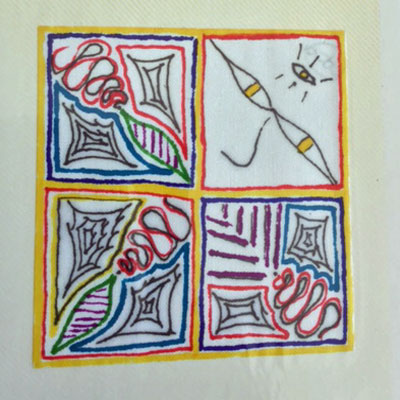
Sea Gull Cellar Bar Napkin Art, artist unknown
Ruins of a Great House
Derek Walcott
though our longest sun sets at right declensions and
makes but winter arches,
it cannot be long before we lie down in darkness, and
have our light in ashes. . .
Browne, Urn Burial
Stones only, the disjecta membra of this Great House,
Whose moth-like girls are mixed with candledust,
Remain to file the lizard’s dragonish claws.
The mouths of those gate cherubs shriek with stain;
Axle and coach wheel silted under the muck
Of cattle droppings.
Three crows flap for the trees
And settle, creaking the eucalyptus boughs.
A smell of dead limes quickens in the nose
The leprosy of empire.
‘Farewell, green fields,
Farewell, ye happy groves!’
Marble like Greece, like Faulkner’s South in stone,
Deciduous beauty prospered and is gone,
But where the lawn breaks in a rash of trees
A spade below dead leaves will ring the bone
Of some dead animal or human thing
Fallen from evil days, from evil times.
It seems that the original crops were limes
Grown in that silt that clogs the river’s skirt;
The imperious rakes are gone, their bright girls gone,
The river flows, obliterating hurt.
I climbed a wall with the grille ironwork
Of exiled craftsmen protecting that great house
From guilt, perhaps, but not from the worm’s rent
Nor from the padded calvary of the mouse.
And when a wind shook in the limes I heard
What Kipling heard, the death of a great empire, the
abuse
Of ignorance by Bible and by sword.
A green lawn, broken by low walls of stone,
Dipped to the rivulet, and pacing, I thought next
Of men like Hawkins, Walter Raleigh, Drake,
Ancestral murderers and poets, more perplex4ed
In memory now by every ulcerous crime.
The world’s green age then was rotting lime
Whose stench became the charnel galleon’s text.
The rot remains with us, the men are gone.
But, as dead ash is lifted in a wind
That fans the blackening ember of the mind,
My eyes burned from the ashen prose of Donne.
Ablaze with rage I thought,
Some slave is rotting in this manorial lake,
But still the coal of my compassion fought
That Albion too was once
A colony like ours, ‘part of the continent, piece of the
main’,
Nook-shotten, rook o’erblown, deranged
By foaming channels and the vain expense
Of bitter faction.
All in compassion ends
So differently from what the heart arranged:
‘as well as if a manor of thy friend’s. . . ‘
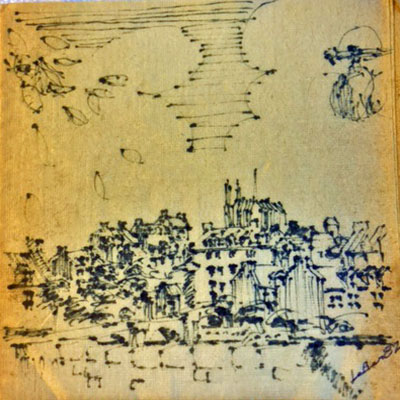
Sea Gull Cellar Bar Napkin Art, artist unknown
Tell Me Not Here, It Needs Not Saying
A.E. Housman
Tell me not here, it needs not saying,
What tune the enchantress plays
In aftermaths of soft September
Or under blanching mays,
For she and I were long acquainted
And I knew all her ways.
On russet floors, by waters idle,
The pine lets fall its cone;
The cuckoo shouts all day at nothing
In leafy dells alone;
And traveller’s joy beguiles in autumn
Hearts that have lost their own.
On acres of the seeded grasses
The changing burnish heaves;
Or marshalled under moons of harvest
Stand still all night the sheaves;
Or beeches strip in storms for winter
And stain the wind with leaves.
Posses, as I possessed a season,
The countries I resign,
Where over elmy plains the highway
Would mount the hills and shine,
And full of shade the pillared forest
Would murmur and be mine.
For nature, heartless, witless nature,
Will neither care nor know
What stranger’s feet may find the meadow
And trespass there and go,
Nor ask amid the dews of morning
If they are mine or no.
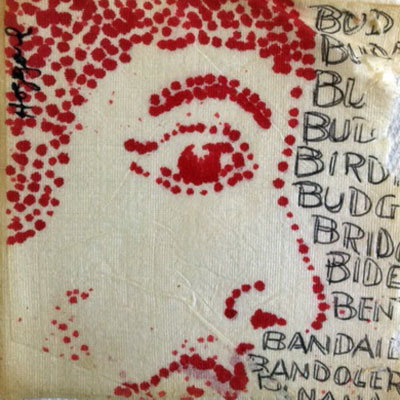
Sea Gull Cellar Bar Napkin Art, Roy Hoggard artist
Remora, Remora
Thomas Lux
Clinging to the shark
is a sucker shark,
attached to which
and feeding off its crumbs
is one still tinier,
inch or two,
and on top of that one,
one the size of a nick of gauze;
smaller and smaller
(moron, idiot, imbecile, nincompoop)
until on top of that
is the last, a microdot sucker shark,
a filament’s tip – with a heartbeat – sliced off,
and the great sea
all around feeding
his host and thus him.
He’s too small
to be eaten himself
(though some things swim
with open mouths) so
he just rides along in the blue current,
the invisible point of the pyramid,
the top beneath all else.
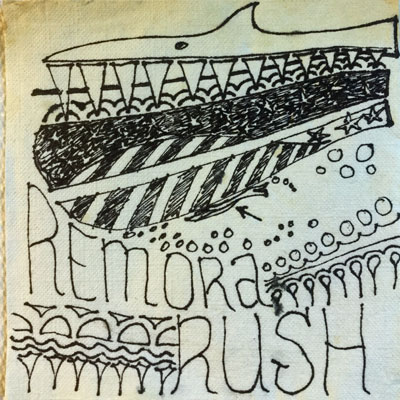
Sea Gull Cellar Bar Napkin Art, artist unknown
Mirage
R.P. Blackmur
The wind was in another country, and
the day had gathered to its heart of noon
the sum of silence, heat, and stricken time.
Not a ripple spread. The sea mirrored
perfectly all the nothing in the sky.
We had to walk about to keep our eyes
from seeing nothing, and our hearts from stopping
at nothing. Then most suddenly we saw
horizon on horizon lifting up
out of the sea’s edge a shining mountain
sun-yellow and sea-green; against it surf
flung spray and spume into the miles of sky.
Somebody said mirage, and it was gone,
but there I have been living ever since.
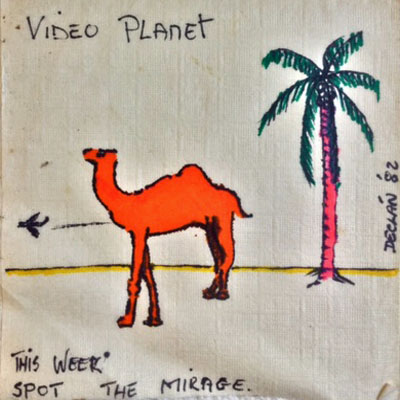
Sea Gull Cellar Bar Napkin Art, Declan artist
Here I am
Paul Bowles
When I am here I shall not mind I shall merely murmur: If no one comes and sees me here it will be all right
Here it is hard to believe that anything is free
Come let us lapse into freedom
Let all these things become less than dust
Let me not think at all ever
Let these things come close together
Let everything be slow and soft
Let the wind blow over the roof at noon
Let everything be soft here because there is no dust
Let anything except what is coming come
That is the way I have always felt
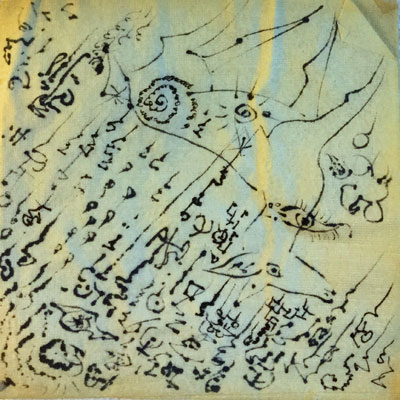
Sea Gull Cellar Bar Napkin Art, artist unknown
Crab
Sharon Olds
When I eat crab, slide the rosy
rubbery claw across my tongue
I think of my mother. She’d drive down
to the edge of the Bay, tiny woman in a
huge car, she’d ask the crab-man to
crack it for her. She’d stand and wait as the
pliers broke those chalky homes, wild-
red and knobby, those cartilage wrists, the
thin orange roof of the back.
I’d come home, and find her at the table
crisply unhousing the parts, laying the
fierce shell on one side, the
soft body on the other. She gave us
lots, because we loved it so much,
so there was always enough, a mound of crab like a
cross between breast-milk and meat. The back
even had the shape of a perfect
ruined breast, upright flakes
white as the flesh of a chrysanthemum, but the
best part was the claw, she’d slide it
out so slowly the tip was unbroken,
scarlet bulb of the feeler—it was such a
kick to easily eat that weapon,
wreck its delicate hooked pulp between
palate and tongue. She loved to feed us
and all she gave us was fresh, she was willing to
grasp shell, membrane, stem, to go
close to dirt and salt to feed us,
the way she had gone near our father himself
to give us life. I look back and
see us dripping at the table, feeding, her
row of pink eaters, the platter of flawless
limp claws, I look back further and
see her in the kitchen, shelling flesh, her
small hands curled—she is like a
fish-hawk, wild, tearing the meat
deftly, living out her life of fear and desire.
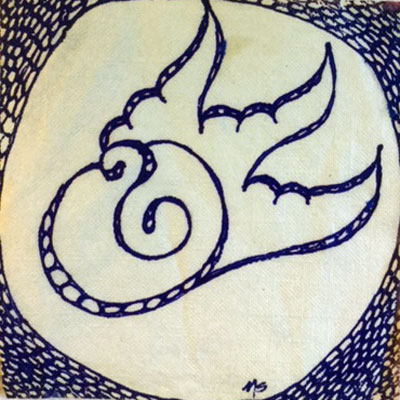
Sea Gull Cellar Bar Napkin Art, MS artist
Song (Romance) of Wine
Emile Nelligan
Translation by
Fred Cogswell
Fresh in joy, life, light – all things coincide,
This fine May eve ! like living hopes that once
Were in my heart, the choiring birds announce
Their prelude to my window open wide.
O fine May eve! O happy eve of May!
A distant organ beats out frigid chords;
And long shafts of sun, like crimson swords,
Cuts to the heart the scent of dying day.
How gay, how glad am I ! Pour out, pour out
Once more the wine into the chiming glass
That I may lose the pain of days which pass
In scorn for all the wicked human rout.
How glad am I ! My wine and art be blest!
I, too, have dreamt of making poetry
That lives, of poems which sound the exequy
For autumn winds that passing far-off mist.
The bitter laugh of rage is now good form,
And I, a poet, must eat scorn for food.
I have a heart but am not understood
Save by the moonlight and the great nights of storm.
Woman ! I drink to you who mock the path
where the rose-dream calls with arms flung wide;
I drink, too, to you men with brows of pride
Who first refuse my hand then scorn my life!
When the starry sky becomes one glorious roof,
And when a hymn resounds for golden spring,
I do not weep for all the days’ calm going,
Who wary grope within my own black youth.
How glad am I ! May eve all eves above.
Not drunk but desperately glad am I !…
Has living grown at last to be a joy?
Has my heart, too, been healed of my sick love?
The clocks have struck and the wind smells of night
Now the wine gurgles as I pour it out.
So glad am I that I laugh and shout
I fear I shall break down and sob outright.
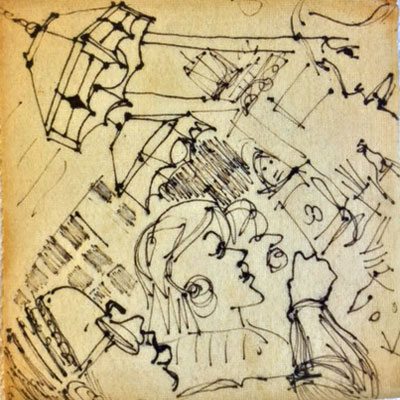
Sea Gull Cellar Bar Napkin Art, artist unknown
The House of Life Sonnet Sequence: Sonnet 63
Daniel Gabriel Rossetti
The changing guests, each in a different mood,
Sit at the roadside table, and arise:
And every life among them in like wise
Is a soul’s board set daily with new food.
What man has bent o’er his son’s sleep, to brood
How that face shall watch his when cold it lies?
Or thought, as his own mother kiss’d his eyes,
Of what her kiss was when his father woo’d?
May not this ancient room thou sitt’st in dwell
In separate living souls for joy or pain?
Nay, all its corners may be painted plain
Where Heaven shows pictures of some life spent well;
And may be stamp’d, a memory all in vain,
Upon the sight of lidless eyes in Hell.
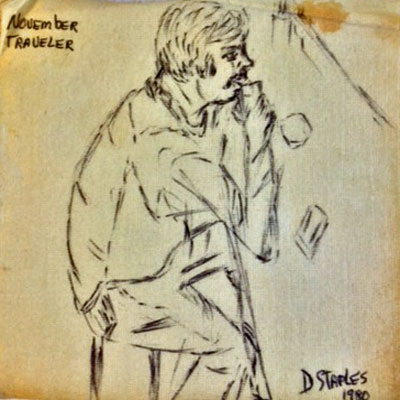
Sea Gull Cellar Bar Napkin Art, D. Staples artist

